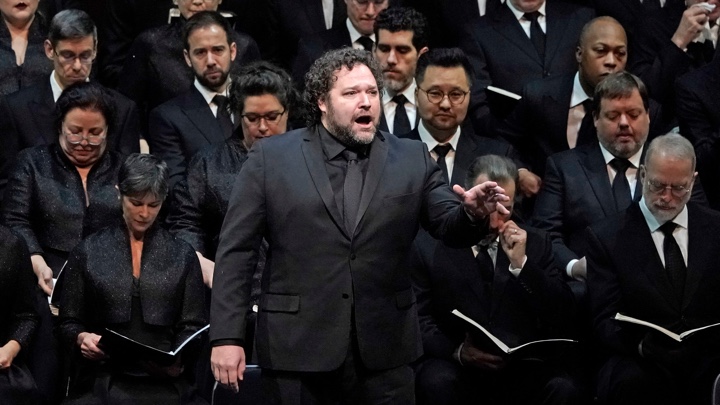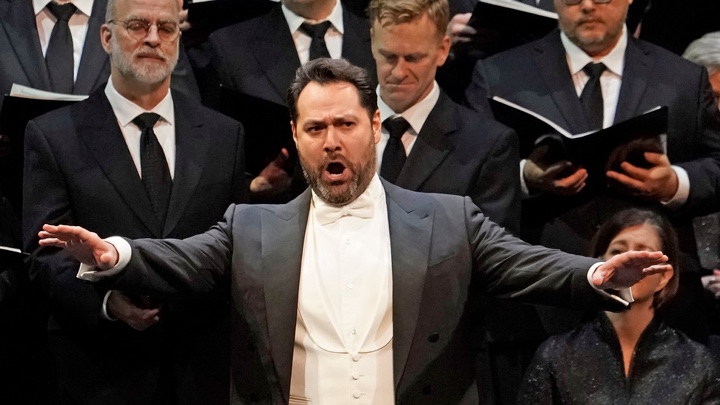
But “must-see” requires some qualification as over the summer the Met announced that its revival of Berlioz’s “dramatic legend” would be performed in a concert version rather than in Robert Lepage’s acclaimed multi-media production which premiered to general acclaim in 2008. The official explanation cited a necessary but prohibitively expensive update to the show’s complex technology.
As Lepage’s widely-reviled Ring has done much to taint his name hereabouts, it’s not a surprise that–having also dropped his new Die Zauberflöte planned for next season—the Met might want to avoid pouring more money into yet another “money-pit” venture by the Canadian director. The startling number of empty seats at Saturday’s matinee suggested that Met audiences weren’t so interested in being served up the other French Faust without sets and costumes but they should rethink that as the fine performance offered many gratifying rewards.
Even though it’s now regularly staged worldwide, Berlioz’s singular adaptation of Goethe’s epic wasn’t intended for production in the opera house in the first place. If Edward Gardner’s vigorous conducting couldn’t entirely make the uneven score cohere, some of the blame rests with the composer whose wild, searching imagination sometimes brought forth unwieldy results.
The score’s well-known, purely orchestral sections, like the “Dance of the Sylphs,” may have occasionally lacked the transcendent magic they can ideally embody, but the Met orchestra returning to the demanding score after more than a decade mostly played with vivid abandon. Subsequent performances may rise to great heights although the original seven have been whittled down to just four.
The vital choruses that dot Damnation were enthusiastically embraced by the nearly 100-member Met chorus clad in black suits or dresses (the latter by Isaac Mizrahi, no less) and seated in five rows of risers. The hearty men in particular, whether as the rollicking students at Auerbach’s tavern or the fiery demons raised by Mephistophélès, rang out almost too lustily perhaps due to the ensemble’s prominently forward stage placement.

Surely the big question on everyone’s minds as the Damnation opening approached was “Would Bryan Hymel sing Faust?” Over the past several years the American tenor’s career has been plagued with high profile last-minute withdrawals, and rumor had it he hadn’t sung the Damnation dress rehearsal. Unusually Berlioz’s work opens without an overture or prelude; Faust immediately begins with one of his several achingly introspective monologues. Halfway through that first piece on Saturday, one felt a collection sigh of relief ripple through the audience as Hymel was singing really well.
Appearing for the first time in a full-length role at the Met since Arnold in GuillaumeTell three years ago, Hymel sounded healthy and in command if slightly nervous. His ringing tenor has gotten bigger and darker if a bit less free, but he demonstrated a real feel for Berlioz whose Les Troyens afforded him several big breaks including an unscheduled Met debut as Énée a decade ago. If he appeared stolidly earnest next to Abdrazakov’s mercuriality and failed to convey the anti-hero’s ruminative, poetic side, Hymel’s stirring Faust proved a real success and an encouraging return to form.
Yet it was not until after intermission and into Part III that Saturday’s Damnation rose to the heights. If the tall and elegant Garanca didn’t exactly evoke the traditional demure maiden, her arrestingly passionate Marguerite bristled with a desperate yearning for the love and excitement ordinary village life denied her.
The Latvian mezzo’s recent repertoire choices have caused some alarm: while a glamorous Eboli in Paris silenced the naysayers, her opulent but ultimately miscast Met Dalila last season was not a success. But Berlioz brought out the very best in Garanca, and both her arias were delivered with both unrivaled beauty and a moving depth of feeling.
Her strong top notes rang out with a new shine while her rich lower voice smoldered with Marguerite’s frustrated passion. Marguerite is a relatively short role so as the final notes of her magnificent “D’amour l’ardente flamme” evaporated into the air as she exited, one felt both pity for the doomed Marguerite and sorrow that that was the last we’d hear from her.
Saturday’s presentation brought the hope that the Met might embrace this untried format and run with it. Though discarding the Lepage staging may have stemmed primarily from economic exigencies, performing works in concert could—and should—open up a new wealth of possibilities.How wonderful to get a chance to hear a beloved artist in a work that might not make sense to mount in a full production. Two or three iterations of Anna Netrebko in Giovanna d’Arco or Jonas Kaufmann in Die Tote Stadt or even René Pape in Die Lustigen Weiber von Windsor would certainly be season highpoints.
Or what about performing difficult-or-expensive-to-stage works like Wagner’s Rienzi, Weber’s Oberon (with Lise Davidsen as Rezia maybe?) or one of those Meyerbeer behemoths so many long for? My vote would go to Berlioz’s challenging but delightful Béatrice et Bénédict with Garanca as its witty heroine.
In the meantime, Garanca’s sublime Marguerite will fall for the wrong scholar just three more times—once for Hymel and then twice for Michael Spyres in his long-awaited Met debut beginning this Saturday evening (if he’s not too pooped from racing to Houston Sunday to rescue its production of La Favorite).
Photos: Ken Howard / Met Opera



